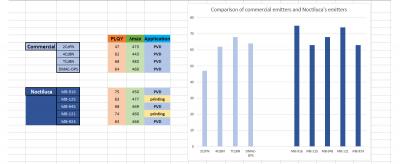OLED ink jet printing: introduction and market status - Page 6
JOLED and AERQ to integrate medium-sized OLED displays in aircraft cabins
Japan-based inkjet printed OLED JOLED announced a partnership with Germany-based AERQ to integrate medium-sized OLED displays in aircraft cabins.
AERQ, interestingly, is a joint venture between LG Electronics and Lufthansa Technik, founded in 2019. AERQ aims to introduce innovative technologies to the aviation industry, and the company provides a digital ecosystem for aircraft cabins that consists of an open IT platform, inseat system, and Cabin Digital Signage. AERQ has already been showing large-area OLED display for aerospace applications (using panels by LG Display).
NajingTech produces Quantum Dot Displays with Inkjet Technology from Notion Systems
This is a sponsored post by Notion Systems
Najing Technology Corporation Ltd., the leading Chinese manufacturer of quantum dot materials uses the Notion n.jet display systems for QD displays and light emitting diodes development and pilot production.
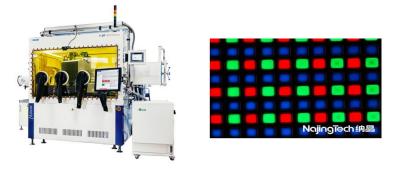
The n.jet display series prints functional layers in various steps of display production and for various display technologies. This includes rigid, flexible, OLED, QLED and LCD displays. In addition to its unparalleled precision, the platform complies with highest demands on process environment and process stability.
TCL to invest $6.8 billion, plans to start producing inkjet-printed OLED TVs in Guangzhou in 2024
According to reports from China, TCL says its CSOT OLED inkjet printing project is going well, and the company expects to start mass production at its 8.5-Gen Guangzhou T8 (owned by Huaxing Optoelectronics) production line in 2024.
Earlier this year the Guanghzhou development commission issued a report that says CSOT's investment in this R&D and production project will amount to 46 billion yuan ($6.8 billion USD), and the construction of the actual production line will be in 2021-2023.
Notion Systems and M.Braun announce a strategic partnership on OLED inkjet printing equipment
Notion Systems and M.Braun announced a strategic partnership in OLED processing equipment. The two companies will combine their best-in-class OLED production technology to improve the production process offers and enhance market access in Asia.
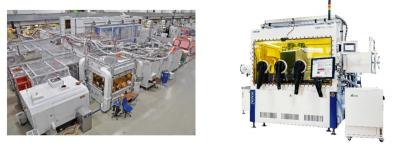
M.Braun is a developer of glove boxes, inert gas purification and automation solutions while Notion Systems is a leading developer of industrial inkjet-printing systems for functional materials, and both companies already enjoy the growing demand of OLED manufacturing in Asia.
BOE details its 55" 8K inkjet-printed OLED TV prototype
In December 2019 BOE unveiled a 55" 8K (160 PPI) OLED TV prototype produced by inkjet printing. The panel achieves a maximum brightness of 400 nits and a color gamut of 95% DCI-P3.
At SID Displayweek 2020, the company demonstrated this display and gave more details regarding its production process and display structure.
Samsung Display developed a 18.2" 350 nits ink-jet printed OLED panel
Samsung Display has developed a 18.2" 2560x1440 202 PPI inkjet-printed OLED display, that features the highest current efficiency of any inkjet-printed OLED, with the brightness at 350 cd/m2 (full white).

Samsung Display says that the high brightness was achieved by tuning the top-emission device structure with high performance soluble materials. The high pixel resolution was achieved by modulating the jetting waveform for ejecting ink drops and improving the drop placement accuracy by selecting the right ink formulations in terms of viscosities and surface energies.
Notion Systems sells several systems for mura free inkjet printing of future displays
This is a sponsored post by Notion Systems
Notion Systems received a major order of several n.jet display inkjet printing systems from a major Taiwanese display manufacturer and underlines its leading position in the market.
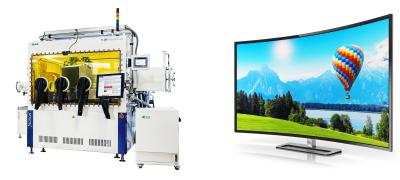
The n.jet display series prints functional layers in various steps of display production, and for various display technologies. This includes rigid, flexible, OLED, QLED, and LCD displays. In addition to its unparalleled precision, the platform complies with the highest demands on process environment and process stability. Specifically developed features, like the no.mura printing technology solve long-standing challenges in the industry and enable an efficient, additive use of the valuable materials involved in manufacturing the next generation displays.
Noctiluca continues to improve its TADF emitter platform
This is a sponsored post by Noctiluca
Poland-based TADF developer Noctiluca reports that the company continues to improve its emitter platform, and the company recently concluded testing a new family of emitters that have revealed great TADF properties, good to excellent QY and blue emission. Noctiluca released the raw data (available from company under the NDA) that details the performance of several new blue emitters. Here is a link to the summary of these results.
Noctiluca’s Team have a history of making custom high purity compounds to specific needs, and its TADF compound family has a high level of customization which will allow the company to tailor its materials for specific OLED stacks. In fact the company's next step is to work with industry leaders and OLED material developers to test its materials within commercial-grade OLED stack architectures to continue its development work and enhance the performance of its OLED emitters.
Tianma orders an R&D OLED inkjet printing system from Kateeva
US-based OLED inkjet printing developer Kateeva announced that Tianma has ordered an R&D 200mm YIELDJet Explore printing system to expand its OLED research and development programs.
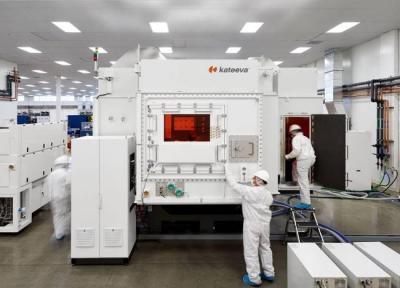
Kateeva reveals that Tianma is already using its TFE system in its OLED mass production fabs. Kateeva also says that this tool will be the 60th Kateeva printer at customer sites.
DSCC lowers its OLED material revenue forecast, now sees a $2.06 billion market in 2024
DSCC updated its OLED material market forecasts, seeing a lower growth ahead. DSCC says the AMOLED stack material market will grow from $928 million in 2019 to $2.06 billion in 2024 in a CAGR of 17%. Only a couple of months ago DSCC estimated that the market in 2024 will reach $2.69 billion - and even these were reduced from earlier estimates due to COVID-19.
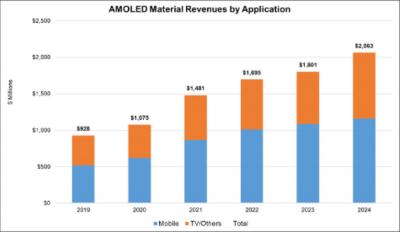
DSCC says that the main reason behind the reduction in its forecast is lower OLED TV capacity. The company now expects a slower ramp up at the Guangzhou fab, and LG's P-10 10.5-Gen fab is now removed from the forecast period.
Pagination
- Previous page
- Page 6
- Next page
